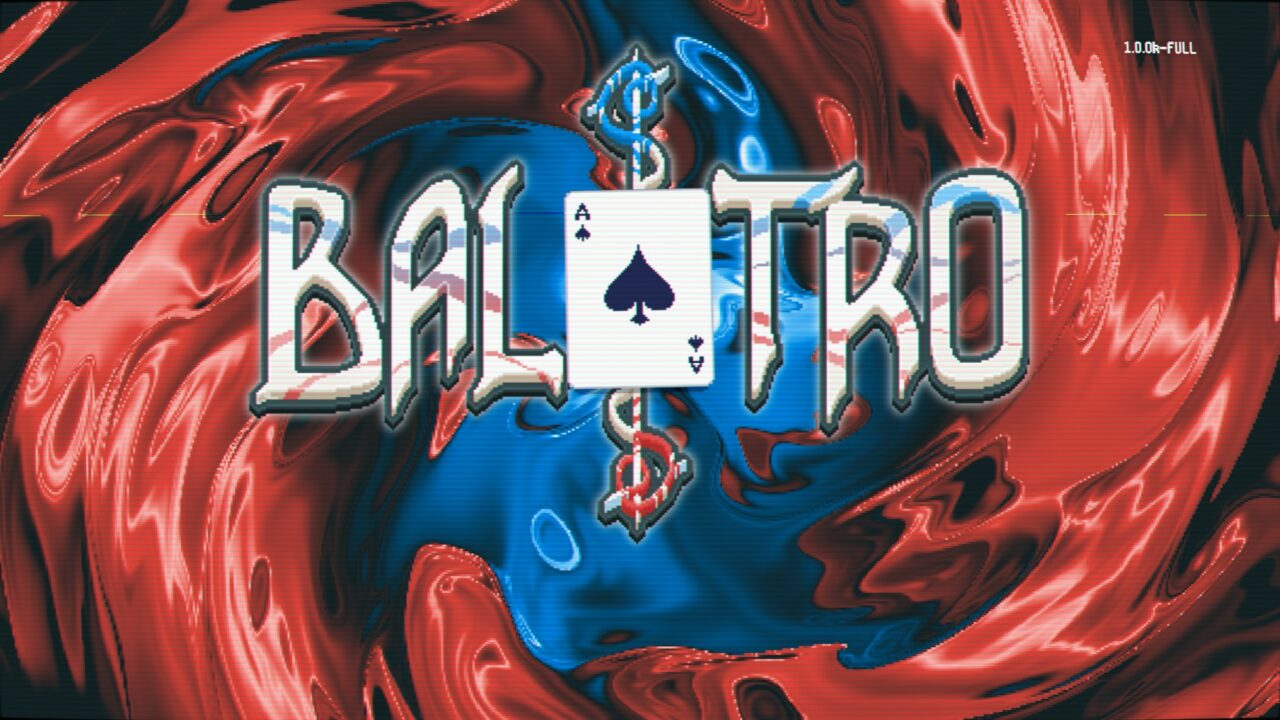Video Gamer is reader-supported. When you buy through links on our site, we may earn an affiliate commission. Prices subject to change. Learn more
Ante 8, the Boss Blind. My deck has been painstakingly crafted for this moment. My jokers are lined up. My glass and steel cards are at the ready. All I need is a flush. But as one hand becomes two, two become three, four, five, no flush appears. The run is over. ‘Looks like the joke’s on us!’ taunts the jester, mocking me with his smug grin.
And yet, despite this crushing defeat mere inches from the finish line, I immediately hit New Run. The vile jester has sunk his faux-CRT claws deep into my brain, and for the last week – morning, noon, and night – beating his infernal games has been the only thing on my mind – this is Balatro.

Balatro is a poker roguelike. You play poker hands to score points and use upgrades and consumables in the form of jokers and tarot cards to increase how many points you can score. You start with hands worth a few hundred points, and if you play your cards right (pun fully intended), you could potentially reach into the quadrillions and beyond.
In the pre-Balatro world, I found myself starting to tire of roguelikes. Don’t get me wrong, it’s one of my favourite genres; I have spent hundreds of hours across the likes of Risk of Rain, Dead Cells, Vampire Survivors, Slay the Spire (of course) and more.
But as the genre has grown – in part thanks to the success of titles like these – the number of games attempting to capitalise on the genre has grown to the point where having ‘roguelike elements’ as a selling point has begun to feel almost ubiquitous. Even AAA titles like God of War are getting in on the action.

And yet, few of these games have managed to capture what makes roguelikes so appealing to me. Sure, you lose and go back to the start, but often, that’s about it, with the main focus of the game being elsewhere, making that roguelike gameplay loop that I crave little more than an afterthought. For many recent games with ‘roguelike elements’, I can’t help but shake the feeling that those mechanics have been shoehorned in to capitalise on a trend.
Balatro takes the genre back to basics, and its reward is a fast, manic, and deeply satisfying gameplay loop that had me hooked from day one.
There’s no story to beat, and beyond unlocking new cards, no permanent progression system. Instead, your only goal is to win the game. Do that, and you might unlock a new deck with different pros and cons. On each deck, every win unlocks a new stake, Balatro’s take on Ascension levels, with each one adding a new restriction to your run.

There’s no messing around, no quests to complete, and no character arcs to overcome; it’s just you versus the jester, riding your luck as far as it will take you. Each run is completely different based on the cards you come across. You might get a joker that pushes you towards playing straights, while on the next run, you’ll get a joker that gives you extra multipliers for every heart you play. The mechanics go much deeper than this, and the combinations you can create are practically endless.
Most of my runs don’t even make it past the first round. But it’s so quick to play that it’s a no-brainer to immediately jump into a new run. With nothing else to focus on, Balatro’s gameplay shines. With every run you gain a deeper understanding of its wild mechanics, coming up with progressively more innovative ways to break apart the very essence of poker. It feels like I’m sitting at a slot machine that I can’t pull myself away from.

Balatro doesn’t want you to win. There’s no ending where you beat the final boss, the credits roll, and you get to see the fruits of your labour. Because once you win, there’s a new challenge to beat, forcing you back to the slot machine all over again. You’ll lose repeatedly, and at higher stakes, it can feel like throwing yourself at a wall to no avail.
And yet, you keep coming back. Though you might not get any permanent upgrades to help you eventually overthrow that damned jester, every game – win or loss – gives you a little more knowledge about the game and new strategies to try out. It’s high risk, high reward. It’s luck-based but still rewards strategy and planning.

Balatro’s back-to-basics approach has everything a great roguelike needs and then some. It can be brutally difficult at times, and when the cards just aren’t falling for you, it feels almost impossible. But when everything clicks, it’s nothing short of magical. Watching the numbers skyrocket hand to hand, round to round, until you finally conquer the game after all those failed attempts – it’s pure, distilled satisfaction that only the best roguelikes can provide.
And then, when it’s all said and done, you go again. For the last week, I have sacrificed endless cards and hours at the altar of Balatro. And in the coming weeks and months, I will no doubt continue to do so. Partly because it’s incredibly fun, partly because I have plenty of challenges to beat, but mostly because I’ll be damned if I let that uppity jester have the last laugh.

